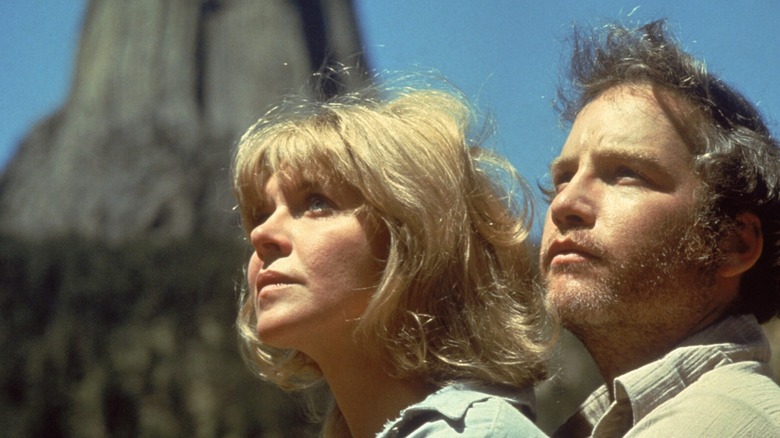How Steven Spielberg Set Denis Villeneuve On The Path To Dune
Dennis Villeneuve read Frank Herbert's "Dune" when he was just 13, and since then, the director longed for a movie adaptation that would bring such a vivid, distinct world to life. Dreams of making an adaptation of his own permeated his formative years, and this urge finally transformed into reality with 2021's "Dune: Part One," which built the foundation for an epic saga set on the desert planet of Arrakis. While "Part One" succeeds in establishing a tangible quality to the primary forces that dominate the film's Known Universe, "Part Two" dives into the rise of a so-called messiah, who transforms into the harbinger of a holy war and etches a legacy rooted in tragedy.
Due to the sheer scale and spectacle that the story beats of "Part Two" demanded, Villeneuve had to overcome the challenges of filming action-heavy scenes in the desert, including the awe-inducing sequences of the Fremen riding Shai-Hulud, the sacred sandworms burrowing inside the dunes. When the sandworm is revealed for the first time in "Part One," it is impossible not to think about the shark's first appearance in Steven Spielberg's "Jaws" — a film from which Villeneuve consciously took inspiration. Just like Spielberg's "less is more" approach of building fear in the moments where the shark can be briefly glimpsed before its blatant attack, Villeneuve lingers on parts of the massive beast before revealing its mammoth form during its encounter with Paul (Timothée Chalamet) and Jessica (Rebecca Ferguson) deep within Fremen territory.
Spielberg's influence on Villeneuve and his love for filmmaking extends way beyond this homage, as the latter was shaped by the former's filmmaking ethos even before he picked up a camera.
Villeneuve's love for Spielberg's filmmaking over the years
In an interview with NPR, Villeneuve spoke about the influence of some seminal Spielbergian films — "Jaws," "Duel," and "Close Encounters of the Third Kind" to name a few — on his dreams of becoming a filmmaker one day:
"There was always a name attached to these movies and this name was Steven Spielberg. And then I started to be more interested about what it meant to be a director. At 13 years old or something like, absolutely fascinated by the idea of, the power of, the tool of the camera. I didn't have any camera in my life, but I was fascinated. There was something so romantic, so powerful about making movies. I became obsessed with the idea of [becoming a] filmmaker."
There is something inherently nostalgic and romantic about Spielberg's oeuvre, as his films tend to leave a tangible mark on anyone with a love and appreciation for the medium. Villeneuve also praised the director during the 2022 DGA Awards while Spielberg was in the audience, thanking him for still being "a pure source of inspiration" after all these years. During his speech, Villeneuve recounted his reaction to watching "Close Encounters of the Third Kind" on the big screen, and how it stuck with him and made him feel at home:
"I wondered who was the magician who transformed trucks into bullies and station wagons into sharks. Then I saw a film that moves me to the core by the kindness of its people coming from the stars and the humanist of a French scientist [...] this movie felt like home to me, and as the credits rolled, I knew that was the way I wanted to live my life".
When Spielberg expressed his love for Dune: Part Two
It sure is a surreal feeling to engage in a conversation with the director who shaped you into the filmmaker you are today, and Villeneuve must have felt that way during an episode of DGA's "Director's Cut" Podcast earlier this year when Spielberg interviewed him for "Dune: Part Two" and discussed the challenges of adapting a massively revered body of work that was molded by Villeneuve's singular creative vision. "This is a desert-loving story, but for such a desert-loving film, there is such a yearning for water in this movie," Spielberg stated, while lauding the director's ability to make Arrakis feel like an ocean, and the sandworms like sea serpents that were benevolent to the natives of the desert alone.
Villeneuve was stunned and overwhelmed by such high praise, especially when Spielberg welcomed him among many prolific filmmakers capable of building complex, riveting cinematic worlds, and hailed "Dune: Part Two" as a stunning "visual epic:"
"Let me start by saying there are filmmakers who are the builders of worlds [...] Starting with [Georges] Méliès and Disney and Kubrick, George Lucas. Ray Harryhausen, I include in that list. Fellini built his own worlds. Tim Burton. Wes Anderson, Peter Jackson, James Cameron, Christopher Nolan, Ridley Scott, Guillermo del Toro. The list goes on, but it's not that long of a list, and I deeply, fervently believe that you are one of its newest members [...] You have made one of the most brilliant science fiction films I have ever seen."
Villeneuve and Legendary are planning to adapt Herbert's "Dune: Messiah," so we can look forward to the epic conclusion of a saga so lovingly crafted by someone with a deep appreciation for rich, cinematic worlds that leave us both enthralled and devastated. The spice must keep flowing.


